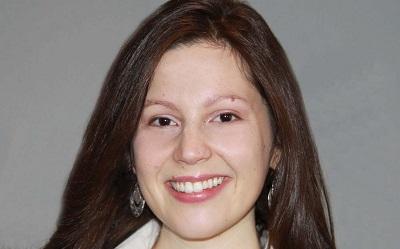Day 226, Year of #Mygration: When Facts Don’t Matter

Today's blog comes from OU alumna, Heidi McCafferty. Heidi has worked in Higher Education and International Development since 2012. She previously managed the OU’s Research Network in International Development and Inclusive Innovation, and later worked for Oxford-based NGO, MANGO. In 2016 she founded her own ethical consultancy firm, HM Consulting & Son, which earlier this year successfully bid to manage the OU’s Year of 'MYgration'.
Each week, the team in The Open University's Development Policy and Practice department, those responsible for international development teaching and research at the OU, come together for half an hour to drink coffee, eat biscuits and talk. As my OU consultant's hot-desk is nearby, they always kindly invite me along to join them. If invited participants expect ‘coffee morning small-talk’ that includes last week’s firing on The Apprentice mind you, they can think on. When you work alongside a team of such passionate academics, you can be assured of an energising, thought-provoking, political debate every time.
The group I was sitting with around the kitchen table yesterday got on to the topic of fake news, populism and of what one academic described as the ‘mob mentality’ we now face. One academic discussed the chilling WhatsApp mob killings in India and his frustrations that politicians who strive for social justice have lost the ability to speak to the ‘everyday listener’. He argued that left-leaning political parties often prioritise gender equality and fairness, which, as we all agreed, is critical, but continue to miss the fact that millions of families are in economic crises. These families and individuals are afraid for the security of their futures and that of their children and turn to the parties who provide them with a ‘solution’. Unfortunately, many of these parties are not as concerned with universal equality and are known to use dangerous rhetoric in order to promote their own agendas. In Dr Fidele Mutwarasibo’s blog yesterday, he looked at how these migration narratives influence the reception and integration of ‘foreigners’. He highlighted how migrants from the West are referred to as expatriates, while those travelling to the UK from elsewhere are often labelled with disparaging terms. Why is the perception, despite an official report by Oxford Economics, which demonstrated that the average EU migrant contributes £2300 more per year to the UK economy than the average Brit, still that migrants are a ‘drain’ on our system? How do these narratives take such hold?
Fidele is one of the most passionate academics I have had the pleasure of working with, an endless source of information, always texting our team WhatsApp group with thought-provoking news articles and videos. Last night he sent a fascinating report by Natalia Banulescu-Bogdan, Associate Director of the Migration Policy Institute’s International Programme, that discusses the challenges faced by migration and integration advocates in getting their messages across in the era of alternative facts and fake news. I was pleased to share the synopsis and report with the team in Development Policy and Practice after our coffee morning and am pleased to share the link to it here, as part of the OU's Year of 'MYgration'.
At a time when people have more information at their fingertips than ever, it feels as though it has become equally easy to share it widely or to ignore, discount, and discredit it. Several factors have contributed to this state of affairs. New technologies have given a platform to a wider range of voices, but this has also meant that unvetted information and politically motivated “fake news” find their way more easily into the bloodstream of public debate. Human nature also shapes how people consume and recall information, making them more likely to resist information that contradicts their existing beliefs and personal experiences.
While individual biases can and should be interrogated, what is new is the propensity to elevate anecdotal examples of flawed science to an indictment of scientific inquiry itself.
Nowhere has this been more apparent than in debates about hot-button issues such as immigration. Whether in the run-up to the 2016 UK referendum on Brexit, elections across Europe and North America, or responses to the 2015–16 European refugee and migration crisis, emotionally charged and anecdotal narratives about immigrants, refugees, and their effects on receiving communities often seemed to drown out arguments made on the basis of robust data and evidence.
Policymaking in democratic societies relies on the engagement of an electorate able to access and think critically about new information and to adjust their views accordingly. This report explores why there is often a pronounced gap between what research has shown about migration trends and immigration policy outcomes and what the public believes. To do so, it explores the social psychological literature on why people embrace or reject information, as well as recent changes in the media landscape. The report concludes with a re-examination of what it takes to make the "expert consensus" on these issues resonate with sceptical publics, including recommendations for policymakers and researchers seeking to communicate more effectively the costs and benefits of immigration.
If people can remember something easily, they are more likely to remember it as being true.
Critical lessons for policymakers outlined in the report include:
Cost-benefit analysis may miss the point
Arguments that may be seen as personal attacks should be avoided
Giving people a way out instead of proving them wrong
Avoiding repeating false ideas – even to debunk them
Engaging, credible messengers from across the aisle
Starting to build a culture of critical thinking before an election cycle or crisis
Read the full report by Natalia Banulescu-Bogdan on the Migration Policy Institute's website
Quarterly Review of Research
Read our Quarterly Review of Research to learn about our latest quality academic output.

Contact our news team
For all out of hours enquiries, please telephone +44 (0)7901 515891
News & articles
- Shaping a sustainable future – the power of Open Research 24th April 2024
- New research into Pompeii to be revealed by OU/BBC co-production 12th April 2024
- OU research among UK funding boost for international space projects 8th April 2024
